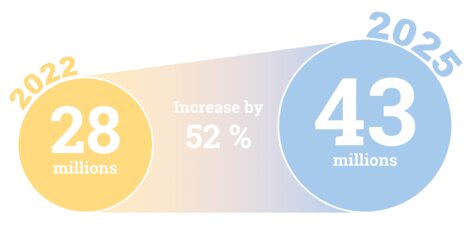 89Stocker
89Stocker
Safe and healthy workplaces
ed* Nr. 01/2024 – Chapter 6
Mental health has also reached occupational health and safety. Both the Council and the EU Parliament have engaged intensively with this aspect and identified precarious work as a major cause. In addition, the relevant European agencies have worked together with the EU Commission to further develop the applicable occupational health and safety regulations. For example, the directive on the protection of employees against the risks posed by asbestos in the workplace has been made more stringent and adapted to modern technological possibilities. The exposure limits for lead have been lowered and limit values for diisocyanates have been set for the first time.
Use of chemicals in the workplace
In October 2020, the EU Commission presented the Chemicals Strategy for Sustainability. Among other things, it made far-reaching proposals to address contamination by per- and polyfluoroalkyl substances (PFAS). Initial measures have been initiated under the Persistent Organic Pollutants Regulation, among others. In January 2023, five countries, including Germany, have also submitted a request to the European Chemicals Agency (ECHA) to significantly restrict the use of PFAS. It can be assumed that the topic will be prioritised in the next legislative period.
Further reform of the directive on chemical agents and the directive on carcinogens, mutagens and reprotoxic substances is also planned. But also other substances such as bisphenol and boron are already on the ECHA’s agenda. The “One substance, one assessment” reform package published in December 2023 also aims at a coherent safety assessment of chemicals and, as a first step, will create the legislative basis for a common data platform and a monitoring and forecasting framework for chemicals. Whether and when the revision of the REACH regulation announced by Ursula von der Leyen to simplify the legal framework for chemicals will take place is still uncertain. The EU Commission also wants to clarify in principle what a practicable approach to the risk assessment of substances should look like. In the view of the DSV, the hazard-based approach pursued in the chemicals strategy is not realistic in all areas, for example in occupational safety. It should remain possible to use hazardous substances industrially if the protection of employees is adequately guaranteed.
New forms of work and platform work
Feedback and position papers
From 2019 to 2024, the DSV drafted position papers on numerous EU initiatives. 30 of the position papers were clearly related to health policy and, in addition to the major reform proposals, also related to topics such as vaccinations against carcinogenic viruses, tobacco control and the taxation of alcohol. A further 29 had a social policy or more horizontal orientation. These include, for example, the position papers on platform work, the legal framework for Al, the Supply Chain Act and theharmonisation of insolvency law.
The 9th legislative period had a clear social policy focus with a plethora of health and social policy initiatives. It should be emphasised that, in addition to pure legislation, a high-level expert group on the future of social protection was set up at the end of 2021, chaired by the former EU Commissioner Anna Diamantopoulou. The group presented its report in February 2023: In addition to digitalisation and demographics, the focus was also placed on new forms of work. In this context, the fact that the EU Parliament and the Council were able to agree on a directive to improve working conditions in platform work despite the most difficult negotiations should be viewed as a highlight of the 9th legislative period. This means that in future, the question of whether someone is employed or in self-employment will be approached in a standardised way throughout the EU. From the DSV’s point of view, it is important that the use of AI in the context of algorithmic management is regulated here for the first time. This means that platform operators using this management tool have to answer questions about how their AI works and why it arrives at certain results. This approach is to be extended to other economic sectors in future.

Developments in our century are largely defined by volatility and uncertainty. Fighting climate crisis, managing digital disruption, reaffirming the importance of social protection and the role of the State in upholding human dignity, are some of the major challenges facing Europe. Social protection is EU’s crown jewel.
Anna Diamantopoulou, Chair of the High-Level Expert Group on the future of social protection and the welfare state
Digital Platform Workers in the EU


